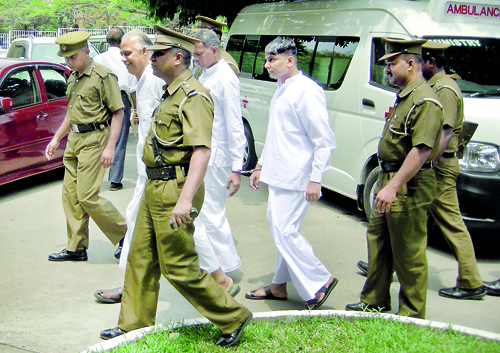News
SC upholds death sentence imposed by High Court on the 4 accused
The Supreme Court on Wednesday noted that it is “utterly horrific for members of the forces in a country to unlawfully detain, physically and mentally assault and thereafter, abduct and murder persons who are in their custody.”
A Five-Judge Bench of the Supreme Court, comprising Justices Shirani Thilakawardena, Chandra Ekanayake, Sathya Hettige, Priyasath Dep and Eva Wanasundara, made this observation when they reaffirmed the death sentence pronounced by the Colombo High Court on the four accused police personnel of the Angulana Police station for the murder of two civilians who were in their custody in 2009.

The Angulana murder case convicts being brought to court on Wednesday.
The persons convicted by the High Court were Indrawansa Kumarasiri, a former Police Constable, T Vitty Newton, former OIC, Dhammika Nihal Jayaratne, a Police Constable and Janapriya Senaratne a former Home Guard.
They were accused of assaulting and subsequently killing Dinesh Tharanga Fernando and Dhanushka Aponso who were arrested by them in August 2009 on a complain made by a woman resident in Angulana, saying that two persons had entered her house while she was asleep and had tried to sexually harass her.
“One should not forget that being a member of the forces is an honourable position, where the lives of the citizens have been entrusted to them. This power should not be used to abuse, intimidate and generate fear in the minds of the public,” the Supreme Court held.
“When a person is detained, he is merely a suspect; he has not been found guilty according to the laws of the country, and therefore, allowing the forces to behave in such a manner and punish the detainee, cannot, on any count, be condoned, as is the basis of the arguments of this defence,” the Supreme Court observed.
Their appeals were based on the grounds that, in the case of three of the accused, they were in a state of intoxication when the murders took place, while in the case of one, that he was carrying out orders from the superiors.The Court cited the Gambian case Banday (1948) 15 where it was held that “The common result of the consumption of liquor is that it makes a person reckless as to the consequences of his actions. That, however, is not a defence in law.
The Supreme Court said that similarly, we do not accept that 1st, 3rd and 4th accused could escape from the consequences of their actions by alleging intoxication as a defence. “As Police Officers, allowing the defence of intoxication to stand would be entirely unjust, as they are expected to safeguard the rights of the people and prevent situations such as what has transpired in this case,” the court noted.
“What is thoroughly alarming is the callous manner in which these officers have treated their respective duties. It is established that they, subsequent to consuming alcohol, returned to the Station to resume their public duties, and a rather worrying question arises in our minds as to how the protectors of the public could voluntarily intoxicate themselves and deliberately put themselves in a position where they are unable to control their actions when discharging their duties,” the Court said.


